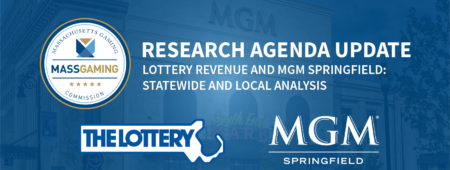From SEIGMA: UMass study examines how the first year of MGM Springfield’s operations affected the Massachusetts State Lottery
- April 09, 2020
- by MGC Communications
- 0 comments

AMHERST – Today researchers from the University of Massachusetts Amherst, who are conducting a comprehensive, multi-year study known as the Social and Economic Impacts of Gambling in Massachusetts (SEIGMA), presented an analysis of state and regional lottery revenue after the first year of operation for MGM Springfield casino in Springfield, Massachusetts. The study represents a first look at lottery sales since the casino opened.
The bulk of SEIGMA’s research has been on the social and economic impacts of the new casinos in Massachusetts. This report, similar to one done for the Plainridge Park Casino in 2018, describes changes in lottery revenue statewide, in Springfield, and in the communities surrounding MGM Springfield, for the purpose of identifying potential impacts associated with expanded casino gambling. MGM Springfield opened in 2018.
Lottery sales statewide are the largest source of local aid for all communities, in the form of unrestricted general government aid. SEIGMA’s lottery research is undertaken due to the Commonwealth’s concern that expanded casino gambling may decrease lottery revenue, and therefore local aid. The Legislature addressed concerns related to the lottery in the statute by requiring casinos to establish promotional agreements with the Lottery and also to dedicate a portion of gross gaming revenue taxes to local aid as a means of addressing potential impact.
“This research was completed in advance of the temporary suspension of casino operations. Its findings are important to the gaming landscape ahead. The Legislature issued a clear mandate in the gaming law, requiring measures to protect the state’s successful lottery in order to assure that local aid remains a reliable source of funding for communities across the Commonwealth. The use of research will be critical to our ability to assess and inform policy reflecting the rapidly changing environment due to the global pandemic,” said MGC Chair Cathy Judd-Stein.
Lottery sales statewide increased in the first year of operation of MGM Springfield while decreasing over the same period in Springfield and surrounding communities (Agawam, Chicopee, East Longmeadow, Holyoke, Longmeadow, Ludlow, West Springfield, and Wilbraham), indicating a potentially negative local economic effect. However, the volatility of lottery sales data and a relatively brief period of time since MGM Springfield opened leaves the link between the decline in revenue and the casino unclear.
Massachusetts
- Total lottery sales in MA increased 6.50% in the first year after MGM Springfield opened versus the year before.
- The lottery generated $1.1 billion in profit (the key source of local aid) in fiscal year 2019, an all-time record.
Springfield
- Total lottery sales in Springfield decreased 3.05% in the first year after MGM Springfield opened versus the year before.
- This decline in sales may reflect random annual fluctuation in lottery sales or unusually high sales in Springfield in the year just prior to the casino opening.
Surrounding Communities
- Total lottery sales in the surrounding communities decreased 0.38% in the first year after MGM Springfield opened compared to the year before.
- Of the surrounding communities in the first year after MGM Springfield opened compared to the year before, lottery sales increased in Chicopee (0.16%), Longmeadow (2.03%), Ludlow (1.90%), West Springfield (0.72%), and Wilbraham (7.81%) and decreased in Agawam (-2.68%), East Longmeadow (-2.37%), and Holyoke (-3.08%).
The Economic & Public Policy Research group of the UMass Donahue Institute leads SEIGMA’s economic impact research. “Our research identifies correlation between the opening of casinos and changes in lottery revenue. It does not establish causation,” said Mark Nichols, professor of economics at University of Nevada, Reno and author of the lottery report. “There is evidence that the decrease could reflect random fluctuation or unusually high sales in Springfield in the year just prior to the casino opening. And of course, we do not know if the money not spent on lottery was spent in the casino. Additional data and analysis, including patron spending behavior, should allow for more definitive conclusions to be made and distinguish between a longer-term, casino-induced change in revenue from normal year-to-year variation.”
Subsequent reports will examine these important trends when further years of data become available and allow a clearer distinction between a longer-term change in lottery sales from year-to-year variation.
Read the full report.
Related documents: Presentation and One-Page Fact Sheet.
###
The Social and Economic Impacts of Gaming in Massachusetts (SEIGMA) project fulfills Section 71 of the 2011 Expanded Gaming Act, which requires the Massachusetts Gaming Commission to establish “an annual research agenda” to assist in understanding the social and economic effects of the introduction of casino gambling in MA, and in making annual scientifically-based recommendations to the Legislature. For more information, www.umass.edu/seigma/.
Responsible for SEIGMA’s economic and fiscal impact research, the University of Massachusetts Donahue Institute is an outreach and economic development arm of the University of Massachusetts President’s Office. Established in 1971, the Institute strives to connect its clients with the resources of the University, bridging theory and innovation with real world public and private sector applications. For more information: www.donahue.umassp.edu